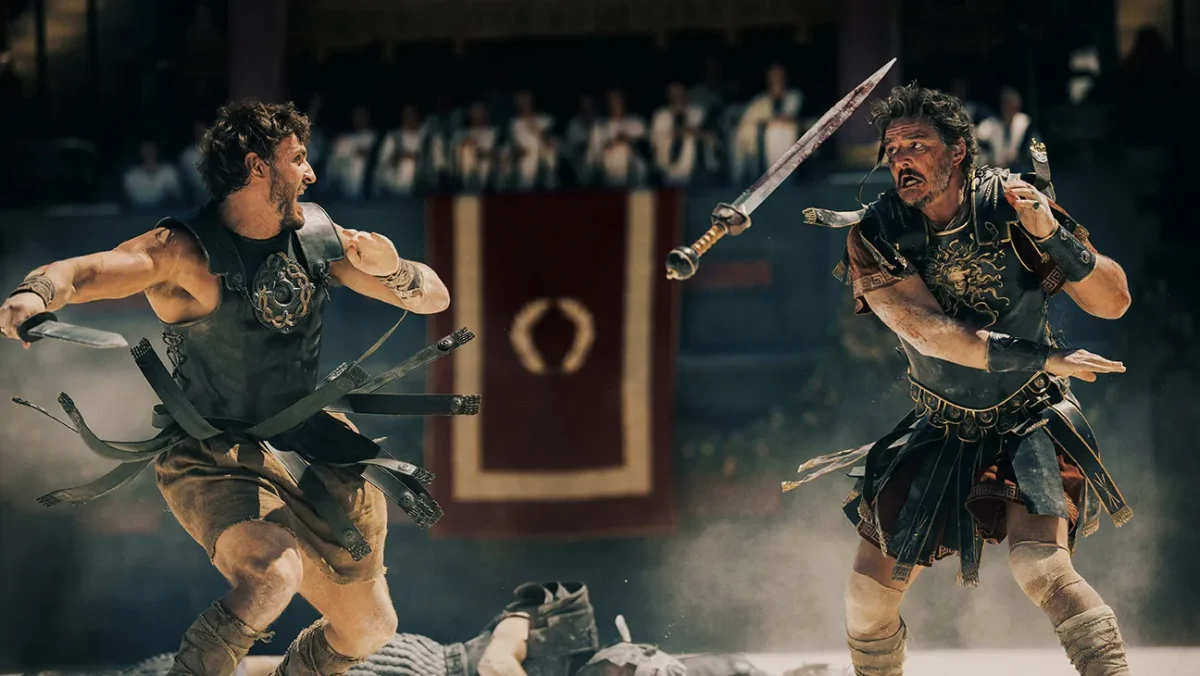Ridley Scott’s historical epic “Gladiator” was brought back to life with “Gladiator II.” More than two decades after the release of “Gladiator,” the sequel carries the weight of its predecessor with standout performances from Denzel Washington, Paul Mescal and Pedro Pascal.
Back in the Arena
Where the original “Gladiator” focused on themes of revenge and honor, “Gladiator II” broadens these themes and dives into the corrosive effects of colonization and imperial ambition. These themes feel particularly timely, offering sharp critiques of historical and modern power structures. Scott’s direction ensures the message is delivered, drawing clear parallels between ancient Rome and the modern world.
At the center of the story is Lucius (Mescal) the son of Lucilla from the original film. Mescal delivers a strong and effective performance, but the character writing feels somewhat underdeveloped. He’s a man consumed by anger, which is understandable, but the film misses opportunities to explore his humanity in a meaningful way. He sort of feels like a low-grade copy of Maximus from the original, and doesn’t really bring anything new to the table. His lack of depth and relatability make it hard to fully root for him. Nonetheless, Mescal’s performance is powerful and one cannot deny his abilities as an actor.
A Commanding Presence
Pascal delivers a nuanced performance in his portrayal of Marcus Acacius, a Roman general against Rome’s corruption. Critics have praised Pascal for his ability to characterize and embody military discipline and personal conflict.
Washington’s performance as Macrinus is assertive and nothing short of captivating. Washington commands the screen with every word and gesture. While his character is well-written and well-performed, it lacks the depth of backstory that could have elevated it further. There’s a sense that much of his history exists just beyond the edges of the script and the film’s reluctance to explore this leaves the audience wanting more. Despite this, Washington’s presence elevates the film and his character’s sharp dialogue and calculated actions bring a much-needed complexity to the narrative.
A Timely Message
What “Gladiator II” does exceptionally well is incorporate themes of colonization and systemic exploitation into the narrative. The film doesn’t shy away from showing the brutality and moral decay of politics and these moments resonate with real-world issues today. The commentary feels purposeful and necessary, providing the movie with a weight that goes beyond spectacle.
Historically Accurate?
True to Scott’s reputation, the film is a visual masterpiece. The battles are grand and brutal although a bit more violent than the original and the cinematography captures both the grandeur and the grime of ancient Rome.
However, the film takes significant liberties with historical accuracy similar to its predecessor. Several elements have been identified as glaring anachronisms or fabrications that depart from the realities of ancient Rome.
The depiction of the Colosseum hosting naval battles featuring sharks has been widely criticized, as there is no evidence that sharks were involved. Additionally, the film portrays Roman nobles sipping tea in café-like settings, which is entirely anachronistic.
Despite these inaccuracies, Scott still created a captivating story. Some people argue that compelling storytelling can outweigh commitment to fact, which is a stance that continues to divide audiences and historians alike. Nonetheless, the film still is able to use its creative liberty and produce historical and political commentary alike.
Final Thoughts
“Gladiator II” is a worthy successor to the first film. It delivers an interesting story, strong performances and a timely message about the dangers of unchecked power and colonization. While it stumbles in its character development, the film’s bold commentary and stunning execution make it a thrilling watch.



